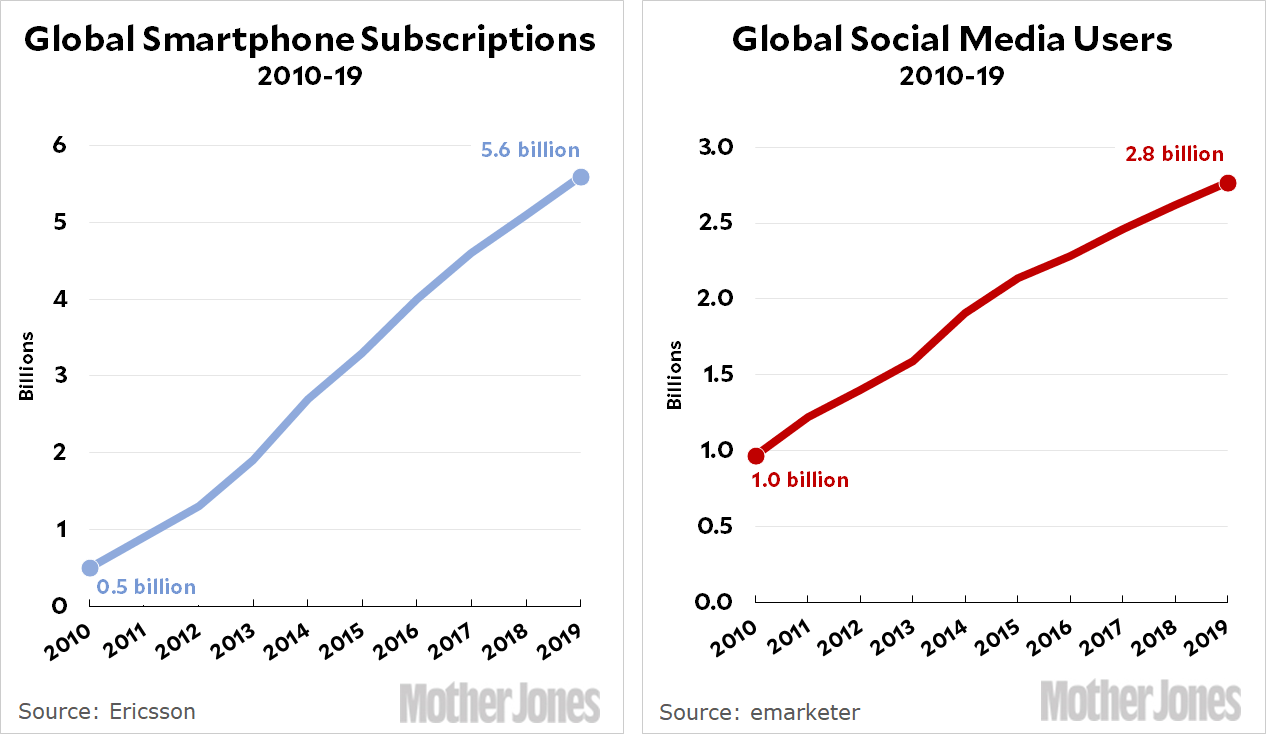Naturally enough, everyone is writing this week about the decade just past. I’ve been reading a lot of these essays and pondering the same question myself. What did it all mean?
I don’t know. It’s the decade when social media flew out of control. It’s the decade when AI got a lot of hype but was still too underpowered to take seriously. It was the decade when the Republican Party—and quite a few Americans—simply decided they didn’t care about much of anything anymore except keeping liberals out of power. It was the decade when gene editing finally became real with the development of an effective and cheap version of CRISPR. It was the decade when electric cars still didn’t have much of an impact. It was the decade when, yet again, the world did nothing about climate change. It was the decade when the South finally took over college football completely. It was the decade when Islamic terrorism died out. It was the decade when democracy allegedly began a slow decline in favor of autocracy and populism. It was the decade of the superhero movie. It was the decade of facial recognition. It was the decade of a long, slow economic recovery that, somehow, no one seemed to enjoy.
It’s a lot easier to judge decades when they’re far enough away that you know them only from history books. It’s easy for me, for example, to think of the ’30s as the decade of the Great Depression; the ’40s as the decade of World War II; the ’50s as the decade of Ike; and the ’60s as the decade of the counterculture. But then we start to get to the decades I actually lived through, and the complexity of each one is harder to ignore. Do Millennials have a short, snappy take on the ’70s? Or the ’80s? I don’t, really.¹
So what about the teens? I’m on record as believing that the two most important topics of the current moment are AI and climate change, but neither one had any special impact on the teens as opposed to other decades. And in the political realm, I don’t believe that Donald Trump and right-wing populism represent a long-term sea change in either American or world politics, though I might be wrong about that.
In the end, I suppose the thing to do is compare 2010 to 2019. How did life change most drastically? Smartphones and social media are candidates, especially if you take a global view. Travel didn’t change much. Despite lots of hype, entertainment didn’t change much. War became noticeably less effective except against neighboring countries. CRISPR was probably the most important genuinely new invention.² Racial justice gained a higher profile, but nobody did much about it. Religion continued to slowly decline, but that was just the latest of a longtime trend. Wall Street mostly regrouped after the Great Recession instead of creating new weapons of mass financial destruction.
So . . . I dunno. The decade of CRISPR? The decade of the smartphone? Since CRISPR’s biggest impact will probably come in the next decade, I guess I’d have to go with the smartphone. I have some qualms about this choice that I’ll leave for another post, but unless someone comes up with anything better, that’s my official guess.

¹If you put a gun to my head, I guess I’d personally say the ’70s were the decade of oil crises and the collapse of Bretton Woods; and the ’80s were the decade of Reagan, Thatcher, Deng Xiaoping, and John Paul II. I suppose these seem kind of lame, especially regarding the ’70s, but I really do think the biggest event of the ’70s was the slow collapse of the postwar economic consensus. I mean, what’s the alternative? The decade of disco? The decade of OPEC? The decade of the counter-counterculture?
²New in the sense of crossing a meaningful boundary of cost and usefulness, anyway.














